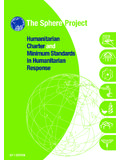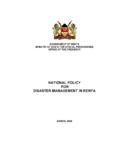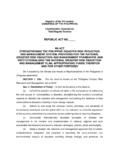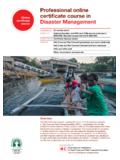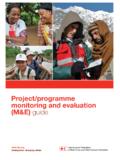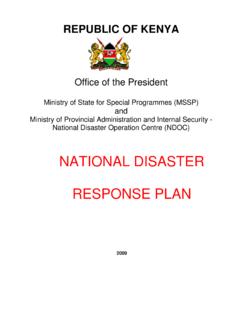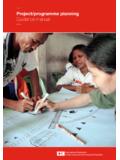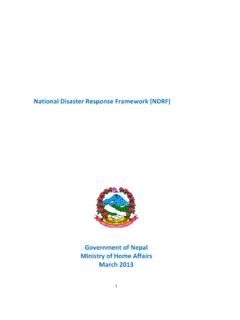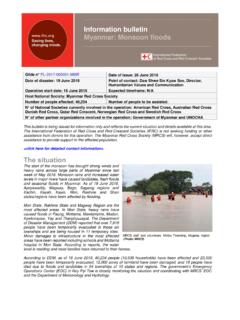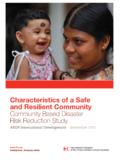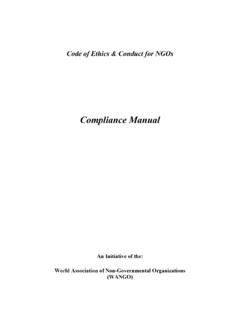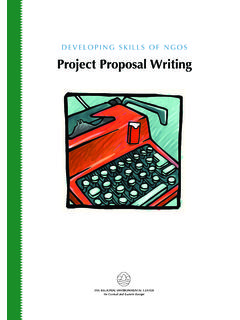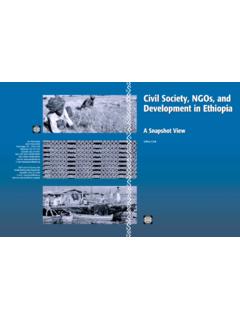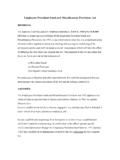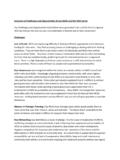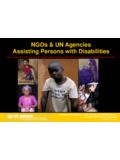Transcription of The Code of Conduct for the International Red Cross …
1 The Code of Conduct for the International Red Cross and Red Cresce Page 1 of 6. The Code of Conduct for the International Red Cross and Red Crescent Movement and ngos in Disaster Relief Annex VI to the resolutions of the 26th International Conference of the Red Cross and Red Crescent, Geneva, 1995. Prepared jointly by the International Federation of Red Cross and Red Crescent Societies and the ICRC [1]. Purpose This Code of Conduct seeks to guard our standards of behaviour. It is not about operational details, such as how one should calculate food rations or set up a refugee camp.
2 Rather, it seeks to maintain the high standards of independence, effectiveness and impact to which disaster response ngos and the International Red Cross and Red Crescent Movement aspires. It is a voluntary code, enforced by the will of organization accepting it to maintain the standards laid down in the Code. In the event of armed conflict, the present Code of Conduct will be interpreted and applied in conformity with International humanitarian law. The Code of Conduct is presented first. Attached to it are three annexes, describing the working environment that we would like to see created by Host Governments, Donor Governments and Intergovernmental Organizations in order to facilitate the effective delivery of humanitarian assistance.
3 Definitions ngos : ngos (Non-Governmental Organizations) refers here to organizations, both national and International , which are constituted separate from the government of the country in which they are founded. NGHAs: For the purposes of this text, the term Non Governmental Humanitarian Agencies (NGHAs) has been coined to encompass the components of the International Red Cross and Red Crescent Movement - The International Committee of the Red Cross , The International Federation of Red Cross and Red Crescent Societies and its member National Societies - and the ngos as defined above.
4 This code refers specifically to those NGHAs who are involved in disaster response. IGOs: IGOs (Inter-Governmental Organizations) refers to organizations constituted by two or more governments. It thus includes all United Nations Agencies and regional organizations. Disasters: A disaster is a calamitous event resulting in loss of life, great human suffering and distress, and large scale material damage. The Code of Conduct Principles of Conduct for The International Red Cross and Red Crescent Movement and ngos in Disaster Response Programmes 1.
5 The Humanitarian imperative comes first The right to receive humanitarian assistance, and to offer it, is a fundamental humanitarian principle which should be enjoyed by all citizens of all countries. As members of the International community, we recognize our obligation to provide humanitarian assistance file://D:\eng\texts\ The Code of Conduct for the International Red Cross and Red Cresce .. Page 2 of 6. wherever it is needed. Hence the need for unimpeded access to affected populations, is of fundamental importance in exercising that responsibility.
6 The prime motivation of our response to disaster is to alleviate human suffering amongst those least able to withstand the stress caused by disaster. When we give humanitarian aid it is not a partisan or political act and should not be viewed as such. 2. Aid is given regardless of the race, creed or nationality of the recipients and without adverse distinction of any kind. Aid priorities are calculated on the basis of need alone Wherever possible, we will base the provision of relief aid upon a thorough assessment of the needs of the disaster victims and the local capacities already in place to meet those needs.
7 Within the entirety of our programmes, we will reflect considerations of proportionality. Human suffering must be alleviated whenever it is found; life is as precious in one part of a country as another. Thus, our provision of aid will reflect the degree of suffering it seeks to alleviate. In implementing this approach, we recognize the crucial role played by women in disaster-prone communities and will ensure that this role is supported, not diminished, by our aid programmes. The implementation of such a universal, impartial and independent policy, can only be effective if we and our partners have access to the necessary resources to provide for such equitable relief, and have equal access to all disaster victims.
8 3. Aid will not be used to further a particular political or religious standpoint Humanitarian aid will be given according to the need of individuals, families and communities. Not withstanding the right of NGHAs to espouse particular political or religious opinions, we affirm that assistance will not be dependent on the adherence of the recipients to those opinions. We will not tie the promise, delivery or distribution of assistance to the embracing or acceptance of a particular political or religious creed. 4. We shall endeavour not to act as instruments of government foreign policy NGHAs are agencies which act independently from governments.
9 We therefore formulate our own policies and implementation strategies and do not seek to implement the policy of any government, except in so far as it coincides with our own independent policy. We will never knowingly - or through negligence - allow ourselves, or our employees, to be used to gather information of a political, military or economically sensitive nature for governments or other bodies that may serve purposes other than those which are strictly humanitarian, nor will we act as instruments of foreign policy of donor governments.
10 We will use the assistance we receive to respond to needs and this assistance should not be driven by the need to dispose of donor commodity surpluses, nor by the political interest of any particular donor. We value and promote the voluntary giving of labour and finances by concerned individuals to support our work and recognize the independence of action promoted by such voluntary motivation. In order to protect our independence we will seek to avoid dependence upon a single funding source. 5. We shall respect culture and custom We will endeavour to respect the culture, structures and customs of the communities and countries we are working in.
